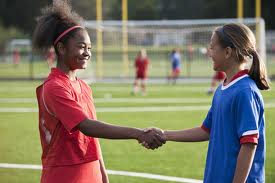When to take a gamble

It won't have escaped the notice of all parents that any investment of time and money in a child, like all investments, is a gamble. Like a lot of gamblers, parents become obsessed with the ups and downs of their investment, and develop emotional attachments to certain aspects of that gamble. Worse, it concerns a child that they have brought into the world, a person who is surely carrying the same genes, the same education of those parents, so the emotional charge and the intensity is doubled.
Or should parents treat this gamble differently? Can we compare this gamble with other investments?
This being a long term investment, creating a tennis player can only really be compared to buying a property. This property is by no means a "new" property, because this investment, this child, comes loaded with baggage (genes and education), that is already in place, and can be modified with difficulty. As with property there is a creative aspect to the investment. Do you have a vision of the end-product? What things can you manipulate and change, to give the most agreeable and servicable results?
Already here are the most difficult circumstances for parents. Very few are qualified to view their child on a distanced, long term basis. They are far too involved in the day to day management of a child's life. Parents are shockingly short term. They are so short term that they make snap decisions about a child, for example buying treats, or issuing a punishment, without considering the long term consequences. Parents are really only interested in a result, now, today, that gets them over the immediate future.
Secondly, any creative venture is sure to run aground early in the project. They may well entrust this creative aspect to coaches, but in fact very few children manage to avoid changing coaches several times in their training, and inevitably end up by being a mish-mash of a tableau, due the varied inputs of different people. Ideally you need one "artistic manager" from beginning to end of the project, and only use supplementary artisitic managers for specific functionswhere the one artistic manager needs to delegate. The extent of any input must be rigidly controlled.
I've been confronted with this problem again recently.
Scouting gamble

A 12 year old girl has, let's call her Grace, in the space of one year, suddenly achieved results, and finds herself in the ladies team. She had her first outing in adults' tennis last week, and the poor child, and her poor mother had had no preparation, or warning, about this important step. For the mother her gamble up till now has been to send her child to training once a week for the last three years, and, just recently, participate in some junior matches, which her daughter, by surprise, won easily.
So this week I saw this girl at play for the first time, and was struck by the whole management of the gamble that the mother has taken. I was delighted to see the mother take real joy in her daughter's enthusiasm to run and compete, and I saw no real evidence of a parent over-committing emotionally into the project.
But it did occur to me that the gamble has not been delineated. There is no project manager. The club coach, with his club competences, has made no longer term preparations for the child, and has taken no "artistic" responsibility for an end product. The child is simply a natural, he would argue, an athletic competitor, and we should let her develop like that. This maxim will be communicated to the parents, and the parents will trust his judgement. But in fact more profound work needed to be done. And if the club coach doesn't do it, who will? The parents, both non-tennis parents, are in no way capable.
When I saw Grace playing, I was impressed. A lovely , simple, truly natural backhand, but very unexploited. Nothing to worry about yet, but in one year's time will need urgent attention. An aggressive "fast hand" forehand, but a shot lacking discipline and control. This needs action now. A service typical of young girls - simply a ball put into the court, a bit in the same fashion as her forehand, without the necessary technique and control. Needs urgent attention. And also no volleys to speak of - at this level of tennis, they don't really exist for girls. But this'll be needed urgently in one year's time.

Planning for success
So my assessment was quite depressing, because first, this child's first foray into adult's tennis risked being a disaster, and in fact it was, she lost heavily. Secondly, a march up the rankings needs careful structuring, needs technical preparation, regardless of the talent available.
I wanted to say to the mother, "Are you ready to take a gamble?"
Are you ready to invest more time and money into your child? Are you ready to appoint an "artistic manager", or full time coach, to overview this gamble?
Tour Coach -
on this site!
